The Symbol of Service to Mankind – The American Red Cross - 1918
The Greatest Humanitarian Movement of Modern Times Originated in a Practical Attempt to Meet a Practical Need with a Practical Remedy. By Stockton Axson, National Secretary, American Red Cross.
The RED CROSS originated in a reasonable attempt to meet a practical need with a valuable remedy. Sometimes a "movement" creates an idea and develops through successive attempts to implement it. Still, Red Cross began in practice and set its "ideas" out of practical situations.
Whimsical philosophers debate whether the hen or the egg "came first." Still, there can be no question about the precedence of practice and ideas in the origin of the Red Cross.
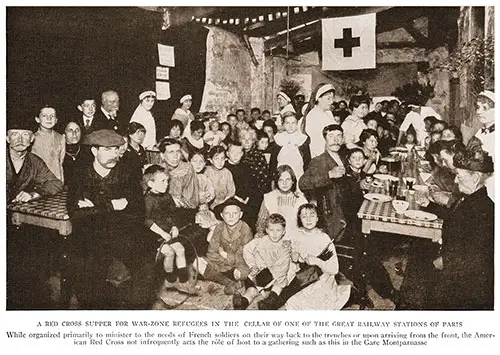
A Red Cross Supper for War-Zone Refugees in the Cellar of One of the Great Railway Stations of Paris. While Organized Primarily Lo Minister to the Needs of French Soldiers on Their Way Back to the Trenches or Upon Arriving From the Front, the American Red Cross Not Infrequently Acts the Role of Host to a Gathering Such as This in the Gare Montparnasse. The National Geographic Magazine, April 1918. | GGA Image ID # 1860e42c36
Red Cross is the greatest humanitarian movement of modern times, equivalent to saying of all times, for humanitarianism is a thoroughly modern thing. Still, this manifestation of benevolence did not originate in theoretical notions of humaneness.
It began in a hospital and on a battlefield, with Florence Nightingale at Scutari and Henri Dunant at Solferino, in actual nursing of sick and wounded soldiers in a base hospital, in authentic salvage of wounded soldiers on a great and bloody battlefield.
There was nothing vague or theoretical in the motive of Miss Nightingale or M. Dunant; it was as practical as rescuing a drowning man or twisting a tourniquet above a severed artery.
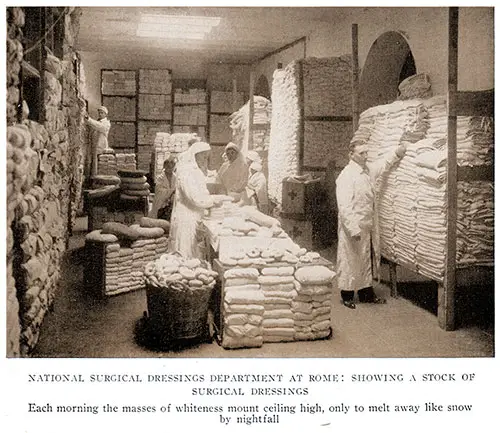
National Surgical Dressings Department at Rome: Showing a Stock of Surgical Dressings - Each Morning the Masses of Whiteness Mount Ceiling High, Only to Melt Away Like Snow by Nightfall. The National Geographic Magazine, April 1918. | GGA Image ID # 18610c9977
The War Correspondent's Dispatch Which Aroused England
When the special correspondent of the London Times—he was William Howard Russell, probably the first war correspondent to render excellent public service and win conspicuous fame—sent dispatches in October 1854 from the front describing the deplorable conditions of the British troops in the Crimea, England was startled and aroused. Said he:
“It is impossible for anyone to see the melancholy sights of the last few days without feelings of surprise and indignation at the deficiencies of our medical system. The manner in which the sick and wounded are treated is worthy only of the savages of Dahomey. . . . The worn-out pensioners who were brought as an ambulance corps are totally useless, and not only are surgeons not to be had, but there are no dressers or nurses to carry out the surgeon’s directions and to attend on the sick during the intervals between his visits. Here the French are greatly our superiors. Their medical arrangements are extremely good, their surgeons more numerous, and they have also the help of the Sisters of Charity, who have accompanied the expedition.”
This was in the middle of the nineteenth century—a century which, so far as England was concerned, was marked above all things by the growth of the democratic and humane idea.
There had been more than twenty years of conscious reform through public agitations and parliamentary measures; extension of suffrage; one parliamentary bill after another providing for better working conditions in the factories and in the mines; for the betterment of living conditions among people experiencing poverty, especially concerning women and children.
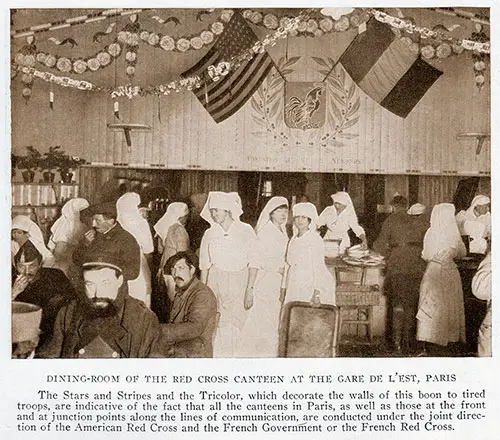
Dining Room of the Red Cross Canteen at the Gare de l’Est, Paris. the Stars and Stripes and the Tricolor, Which Decorate the Walls of This Boon to Tired Troops, Are Indicative of the Fact That All the Canteens in Paris, as Well as Those at the Front and at Junction Points Along: The Lines of Communication, Are Conducted Under the Joint Direction of the American Red Cross and the French Government or the French Red Cross. The National Geographic Magazine, April 1918. | GGA Image ID # 1d82a72bc2
An Age of “Reformatory” Authors
A "school" of literature had sprung up, perhaps the greatest since "the spacious times of great Elizabeth," and the most popular of the many authors who were already making famous the term "Victorian Age of Literature" were those who were most humane, most "reformatory"—Dickens, Carlyle, George Eliot, Ruskin.
Dickens, in particular, had captivated all of England with his humanity as well as with his humor, equally notable as humorist and humanist, and, best of all, basing an incorrigible optimism on the bold assumption that human misery is not "like things" and therefore unavoidable, but contrary to the nature of things and consequently remediable.
In one fascinating novel after another, he had thundered this doctrine, all the more appealing because he uttered in tones of hilarious laughter the principle that if society would bestir itself, society could cure its evils; where there is a will, there is a way.
Never before, and perhaps never since, has a reform program been so engagingly and convincingly promulgated. Literati and politicians, ordinary readers and ordinary voters, all alike were convinced that the world was well on its way to a vast betterment through society's intelligent determination to take charge of its affairs.
Then the articles in the Times broke suddenly and rudely in on this optimism. British soldiers of the nineteenth century suffered like the soldiers of the dark ages or of "savages of Dahomey." England's age-long military tradition, combined with her new-found humanitarianism, stir the nation into angry protest. Something must be done! But what?
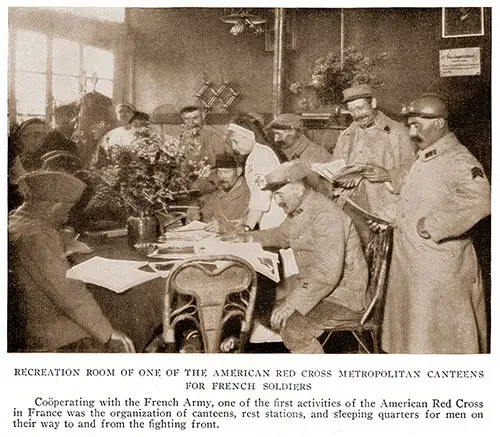
Recreation Room of One of the American Red Cross Metropolitan Canteens for French Soldiers. Cooperating With the French Army, One of the First Activities of the American Red Cross in France Was the Organization of Canteens, Rest Stations, and Sleeping Quarters for Men on Their Way to and From the Fighting Front. The National Geographic Magazine, April 1918. | GGA Image ID # 1d82bbf9ce
Two People Saw the Thing to Be Done
Fortunately, alike for the immediate crisis and the more significant future, two people in England saw the thing that should be done— Mr. Sidney Herbert, one of the Secretaries of the War Department, and Miss Florence Nightingale, then thirty-four years of age, born to considerable wealth and surroundings of superlative culture and refinement, but who had already devoted herself to the mission of developing a more intelligent system of public nursing—a woman of extraordinary ability, whose genius might have made her eminent in any one of several fields of endeavor, but who had chosen this métier which seemed strange to some of her friends and shocking to others.
As a young girl, she had deplored the fact that the Protestant Church made no provision for the training of women comparable to that which the Catholic Sisters of Mercy obtained and had therefore welcomed an opportunity to go to Germany and study with Pastor Fliedner in his institute at Kaiserwerth on the Rhine.
Pastor Fliedner was the sort of German that many million other Germans would be if they would only wake up from their lethargy and cast off their abominable autocracy and militarism and give their own abundant better natures "a chance"—a kind, devoted man, seeking to make himself useful by showing others how to be helpful. In a modest, practical way, he had established an institute for the training of deaconesses in connection with a hospital, a penitentiary, an orphan asylum, and a regular school for the training of teachers.
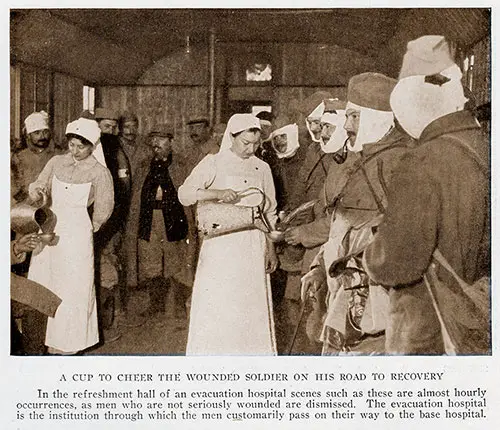
A Cup to Cheer the Wounded Soldier on His Road to Recovery. In the Refreshment Hall of an Evacuation Hospital Scenes Such as These Are Almost Hourly Occurrences, as Men Who Are Not Seriously Wounded Are Dismissed. The Evacuation Hospital Is the Institution Through Which the Men Customarily Pass on Their Way to the Base Hospital. The National Geographic Magazine, April 1918. | GGA Image ID # 1861828cd4
Florence Nightingale’s Nursery Novitiate
Compared with her own later and so much more scientific work of training nurses, Miss Nightingale found the nurse-training feature of the Kaiserwerth School needed to be revised. Still, she found mental and spiritual stimulation and many practical hints for her later career.
Above all, she found what she had been seeking all through her passionate and purposeful girlhood—a way to be "of service to God" by being "of service to man." Intensely religious from childhood, she had never been satisfied with a religion whose chief object was saving her soul. Laborare est orare might have been her motto, and here at Kaiserwerth, she found a means of translating prayer into work.
Her novitiate ended, and she returned to England and began the practical task of hospital nursing. She encountered many obstacles—some of the most stubborn from loving friends still opposed to what seemed to them the quixotic throwing away of a dazzling social career for the drudgery and meanness of hospital life.
That the brilliant Florence Nightingale, whose social gifts fascinated people of genius in letters and diplomacy, should deliberately ally herself with the Mrs. Gamps of the then humble, despised, menial, and frequently dissipated public nursing service seemed nothing less than an atrocity. But Miss Nightingale was as determined as she was brilliant and pursued her way despite opposition.
The point that sentimental biographers of Florence Nightingale miss are that with all her gentler humane qualities, she was like the sternest men of action in her will and purpose. Merely being "good" and "sweet" would never have carried her over her difficult road. Frequently she had to be hard, in the better way of hardness, the way of all great leaders and organizers and aggressive fighters against tradition and inanition.
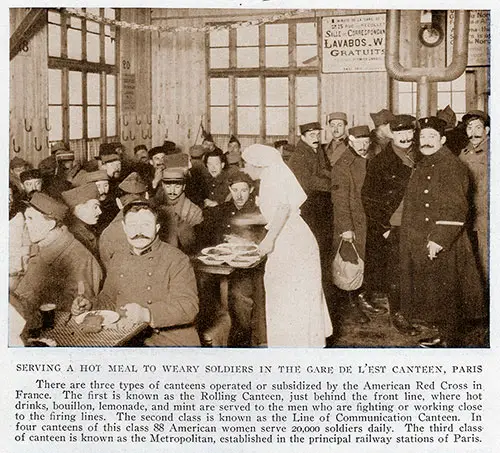
Serving a Hot Meal to Weary Soldiers in the Gare de l’Est Canteen, Paris. There Are Three Types of Canteens Operated or Subsidized by the American Red Cross in France. the First Is Known as the Rolling Canteen, Just Behind the Front Line, Where Hot Drinks, Bouillon, Lemonade, and Mint Are Served to the Men Who Are Fighting or Working Close to the Firing Lines. the Second Class Is Known as the Line of Communication Canteen. in Four Canteens of This Class 88 American Women Serve 20,000 Soldiers Daily. the Third Class of Canteen Is Known as the Metropolitan, Established in the Principal Railway Stations of Paris. The National Geographic Magazine, April 1918. | GGA Image ID # 18619cc124
A Remarkable Coincidence
She was preparing to organize a school for nurses, modeled partly on the Kaiserwerth plan, when Russell's article appeared in the Times.
She had an intimate personal acquaintanceship with Mr. and Mrs. Sidney Herbert, as with many of England's political, social, and literary leaders. She wrote a letter to Mrs. Herbert to be shown to her husband, saying that a "small private expedition of nurses" had already been organized, which she proposed to take to Scutari, and asking if the governmental authority could be secured for them.
This letter crossed one from Mr. Herbert, inviting her to undertake this task for the government. It was one of those coincidences not uncommon in the history of thought when the same idea simultaneously takes hold of different minds.
Because of the significant results of this correspondence, it is not inappropriate to compare the coincidence with Darwin's and Wallace's simultaneous expositions of the evolutionary idea. So it was arranged that Miss Nightingale and her band of nurses should go to the Crimea in the autumn of 1854.
She reached Scutari ten days after the battle of Balaclava (which made the Six Hundred so famous) and one day before the battle of Inkerman. She had her hands full. Besides the wounded, there were the sick, who made her chief problem.
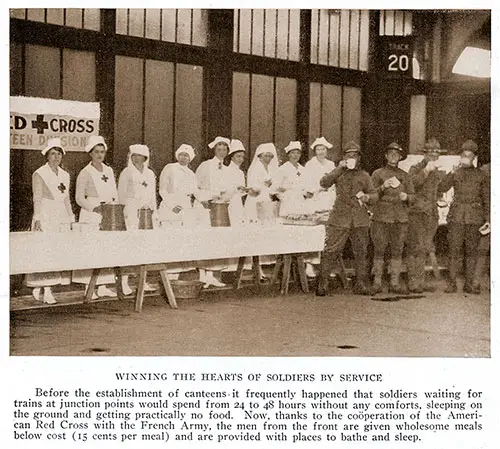
Winning the Hearts of Soldiers by Service. Before the Establishment of Canteens, It Frequently Happened That Soldiers Waiting for Trains at Junction Points Would Spend From 24 to 48 Hours Without Any Comforts, Sleeping on the Ground and Getting Practically No Food. Now, Thanks to the Cooperation of the American Red Cross With the French Army, the Men From the Front Are Given Wholesome Meals Below Cost (15 Cents per Meal) and Are Provided With Places to Bathe and Sleep. The National Geographic Magazine, April 1918. | GGA Image ID # 18623500dd
Terrible Conditions in the Hospitals
The condition of the hospitals was almost unbelievable—floors and walls covered with filth, exposed sewers under-running the hospitals and emitting their foul stench through all the wards, vermin and rats (she became so expert in rat-killing that she could slay a rodent over a sleeper's head without awakening him), sheets of tarpaulin so thick and rough that the poor sufferers pleaded to be left between the blankets and spared the luxury of sheets altogether.
Dysentery, typhus, and cholera were raging, and by February 1855, the mortality had reached 42 percent. The British army was in a fair way of being exterminated.
She had other difficulties than wounds and disease and an unhygienic environment—the opposition of stiff conservative military officers, the medical staff, and religious sectarians. Sturdy old officers who had been wounded in the Peninsular campaign, thrown in carts on a bed of straw, and who had recovered could see no sense in all this modern flummery of ambulances and scrubbed hospital floors.
Such feminization of the army was abhorrent, and they angrily asked if they were to anticipate courts-martial held by women as the next effete step in this degeneracy.
What Florence Nightingale Accomplished in the Crimea
Nor will it do to smile at this as a mere example of "British conservatism." A reading of some of the reports of our military officers of as recent date as the Spanish-American War will reveal equivalent humor in the attitude of the stiffer sort of military mind toward the idea of women in the war zone.
What Florence Nightingale accomplished in Crimea is a part of history—history too long and involved to be summarized in this brief article. But among the things she achieved was setting an example of momentous consequences for subsequent events.
On June 25, 1859, Dunant came upon the battlefield of Solferino, littered with the dead and the wounded of the Italian, French, and Austrian armies—a total, it is said, of 91,243 victims, including three field marshals and nine generals—the bloodiest battle since Waterloo and previous to the holocausts of the present battles of Europe.
Most of the medical corps of the armies had left the field, as regulations compelled them to, to accompany the retreating and pursuing armies. Dunant organized bands of volunteer helpers and transported the wounded to the neighboring village of Castiglione, where he housed them in hospitals, churches, and wherever shelter could be found.
The complete account of all the anguish relieved by Florence Nightingale and Henri Dunant is written nowhere, unless it is in the book of the Recording Angel, of the thousands of dying men made more comfortable in dying and of wounded and sick men saved from dying.
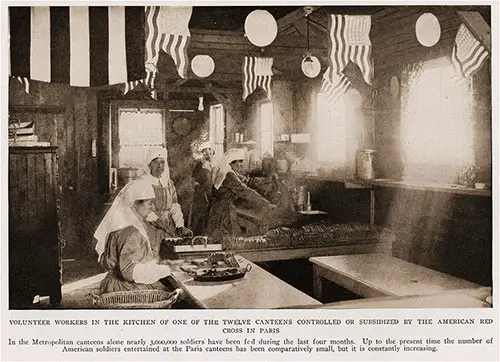
Volunteer Workers in the Kitchen of One of the Twelve Canteens Controlled or Subsidized by the American Red Cross in Paris. in the Metropolitan Canteens Alone Nearly 3,000,000 Soldiers Have Been Fed During the Last Four Months. up to the Present Time the Number of American Soldiers Entertained at the Paris Canteens Has Been Comparatively Small, but It Is Constantly Increasing. The National Geographic Magazine, April 1918. | GGA Image ID # 186257fdaf
The Red Cross Spirit Born at Solferino
But the far-reaching consequence of what these two did is being written daily in the activities of the Red Cross of the present. Every Red Cross nurse, ambulance driver, canteen server, surgical-dressings maker, and knitter of soldier comforts is carrying on the work begun by these two in the 1850s.
The Vision and the Plan of Dunant
Henri Dunant originated the idea of permanent volunteer relief societies in all civilized countries, which in times of peace, would prepare to meet the exigencies of war and, in every way possible, supplement the work of the regular army medical corps, which always has been and always will be unable to deal with the misery of war unsupported by volunteer assistance.
To organize this assistance and correlate it with the army sanitary corps, in strict and loyal subordination to the army commanders, utilizing permanent societies, was Dunant's vision and plan.
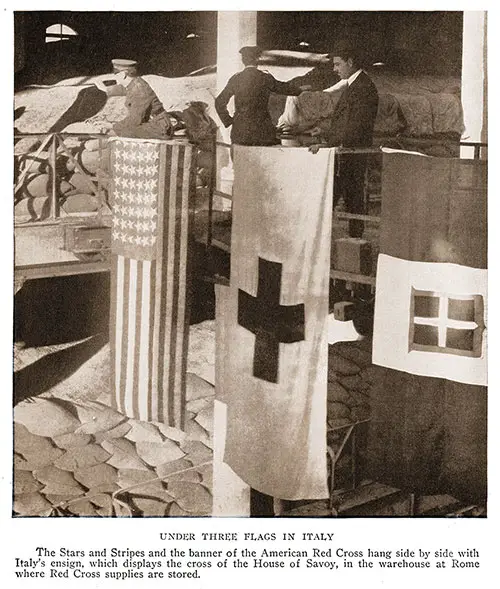
Under Three Flags in Italy. the Stars and Stripes and the Banner of the American Red Cross Hang Side by Side With Italy’s Ensign, Which Displays the Cross of the House of Savoy, in the Warehouse at Rome Where Red Cross Supplies Are Stored. The National Geographic Magazine, April 1918. | GGA Image ID # 18632fb5b9
“Until the German Autocracy Suddenly Went Mad”
Indeed, until the German autocracy suddenly went mad (and it is comforting to remember the ancient adage that "whom the gods destroy they first make mad"), it was considered by those most concerned with American Red Cross that its chief function would Be to relieve the misery incident to floods, conflagrations, earthquakes, famines, and similar natural catastrophes.
Those who were active in raising the Red Cross Endowment Fund a few years ago found that their chief difficulty lay in convincing the people of America that there was any need for an elaborately organized war-relief society, for war seemed a remote contingency to the American people. Only by emphasizing the value of a permanent relief society for those emergencies due to natural causes were the people persuaded to contribute any large sum to Red Cross.
But we reckoned without the Hohenzollerns. These disturbers of the world's peace have brought many changes to the American mind, including a total shift in the conception of the Red Cross, its needs, and its opportunities. The immediate business of the American Red Cross is to mobilize the relief agencies of America for the most destructive and merciless of all wars.
Two Main Conceptions of the American Red Cross
In doing this, it works under two main conceptions: to relieve (and, as far as possible, to prevent) the misery incident to war and to assist in maintaining the morale of the fighting forces.
To lessen the fighting man's misery and to keep him fighting—these seem, superficially, contradictory motives, but all who believe that just peace can be the only lasting peace know that it is superlatively essential to keep our soldiers and our allies fighting edge until the German beast is beaten. The world will never be habitable until that is accomplished.
Red Cross is rooted in a humane idea. Still, the world cannot be made humane until German inhumanity has been brought to a stop, and so long as those who now control Germany remain in control, this can be done only by speaking to them in louder tones than their own, the only language which they comprehend— the language of force.
After the humane nineteenth century, we had reason to prognosticate a more humane twentieth century. But Germany has confused the horoscope; she has made the most astounding assault on humanity in the history of the world, welding to the brutishness of the Hun the ingenuities, resources, and cruel refinements of perfected science.
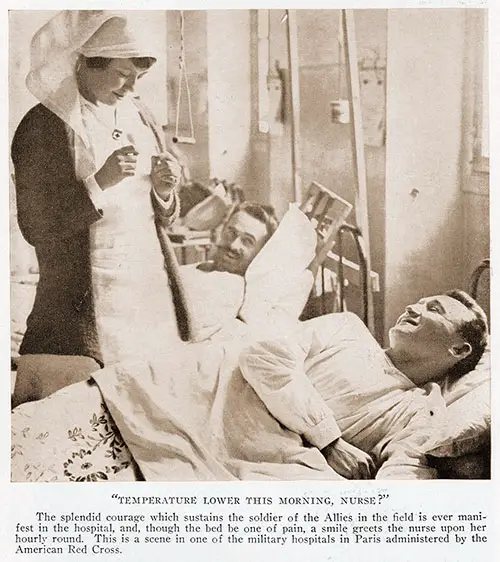
"Temperature Lower This Morning, Nurse?" the Splendid Courage Which Sustains the Soldier of the Allies in the Field Is Ever Manifest in the Hospital, and, Though the Bed Be One of Pain, a Smile Greets the Nurse Upon Her Hourly Round. This Is a Scene in One of the Military Hospitals in Paris Administered by the American Red Cross. The National Geographic Magazine, April 1918. | GGA Image ID # 18635f551e
The Tusks of the Prussian Boar Must Be Drawn
The first business of the civilized world is to draw the tusks of the Prussian boar, and Red Cross is exerting its utmost endeavor to serve the army and the navy in accomplishing that end. While Red Cross does all it can to comfort the wounded soldier, it adopts every device to make the healthy soldier a better fighting man.
Hence, canteens and rest stations, and all their cooperation with the government, YMCA, and other war agencies, render the soldier life as tolerable, comforting, and heartening as possible.
But it goes back of the soldier to the soldier's family. Suppose there is any outstanding lesson that the Red Cross has derived from its experiences in this war as overtopping all other lessons it has learned. In that case, it is this: the soldier's morale depends almost as much on having his family cared for as on having himself cared for.
Though he is warm within and without and given every known modern device for soldier comfort, he will be at something less than his best if he is harassed with anxiety about the wife and children, the old father and mother, behind the fighting line, within the zone of war or beyond it, or even across the far-stretching Atlantic Ocean.
In this conception of the complete duty which the people owe their soldiers, the Red Cross Department of Civilian Relief has become almost as much a war department as the Department of Military Relief.
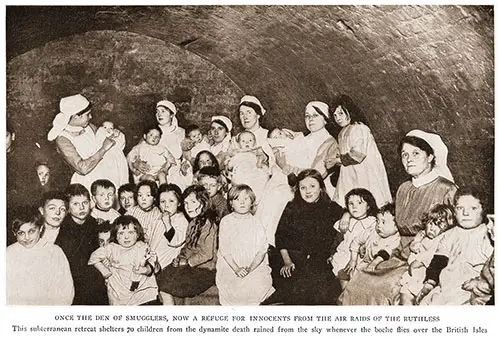
Once the Den of Smugglers, Now a Refuge for Innocents From the Air Raids of the Ruthless. This Subterranean Retreat Shelters 70 Children From the Dynamite Death Rained From the Sky Whenever the Boche Flies Over the British Isles. The National Geographic Magazine, April 1918. | GGA Image ID # 1863958a9c
Civilian Relief Work
That the soldiers' families may be served intelligently as well as generously, the Civilian Relief Department has organized its Home Service institutes, where workers are trained by the most modern and scientific methods to render every conceivable kind of help that is needed, including that most helpful and most delicate and most difficult of all support, the help which helps people to help themselves.
This, of course, is nothing more than the modern science of social service rendered to people as a war measure—that science which combines delicately and intricately the quality of mercy with a clear understanding that mere promiscuous "charity" may be of all things the least kindly in the end.
To preserve people from deteriorating through neglect, and at the same time to preserve them from deteriorating by growing dependent on the easy bounty of others, is, of course, the primary lesson in all rational and responsible social service, and this lesson must be learned by many who would assist the families of soldiers, not sentimentally and to their destruction, but really and to their betterment.
Hence the Home Service institutes are held all over America, and in which those who wish to be of service can learn the difficult lesson of acquiring science without losing their susceptibilities to pity.
Red Cross Educational Work
This work is, of course, educational in its most far-reaching aspect. To this work of education, Red Cross has added another in its Junior Auxiliary—a plan whereby the school children of the country are enlisted in Red Cross activity, not for the sake of their membership fees, because these fees are never applied to the general purposes of Red Cross, but are used entirely to promote the children's activities; not primarily, either, for their production of Red Cross articles, knitted goods, etc., but primarily for the education of the children themselves in foundational principles of citizenship and the application of citizenship to war conditions.
So far, from undertaking to exploit the school children of America for Red Cross activity, the Junior Auxiliary seeks instead to make Red Cross the coordinating agent of all their war activities and thereby save the time of the school children rather than to add an extra burden to the already too many limitations of extra-curriculum activity.
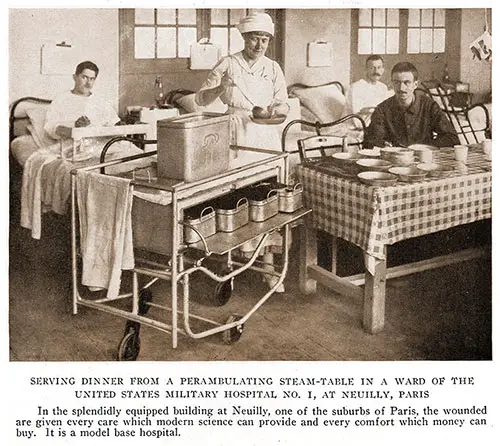
Serving Dinner From a Perambulating Steamtable in a Ward of the United States Military Hospital No. I, at Neuilly, Paris. in the Splendidly Equipped Building at Neuilly, One of the Suburbs of Paris, the Wounded Are Given Every Care Which Modern Science Can Provide and Every Comfort Which Money Can Buy. It Is a Model Base Hospital. The National Geographic Magazine, April 1918. | GGA Image ID # 1863c0616d
“Nothing Stands Alone”
These extensive educational ventures may seem far afield from the thoughts that Henri Dunant had in mind when he and the women of Castiglione were bearing bleeding and groaning soldiers from the battleground of Solferino and when the idea shot through his brain that there should be a permanent organization for this sort of relief.
Indeed, the idea could not have occurred to him then that this single thing he was planning should develop into so complex a matter as the modern Red Cross, with so many ramifications and unsuspected opportunities translated into far-reaching duties.
But this is merely an example of that remarkable fact of the universe of which all philosophers are conscious, that nothing stands alone. Still, everything exists in relationship to something else, and each, in turn, is related to all.
A wounded soldier is a very concrete fact. Still, when humanity has undertaken to care for that soldier, it cannot stop until it has done everything that will rationally administer to his welfare.
And so, step by step, Red Cross has grown logically from physical service to a wounded man into this great complex machinery that touches the soldier's interests at every point and which, for its proper functioning, must invade the fields of education itself.
Stockton Axson, "The Symbol of Service to Mankind," in The National Geographic Magazine, Washington, DC: National Geographic Society, Vol. XXXIII, No. 4, April 1918, pp. 375-387.
